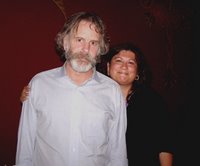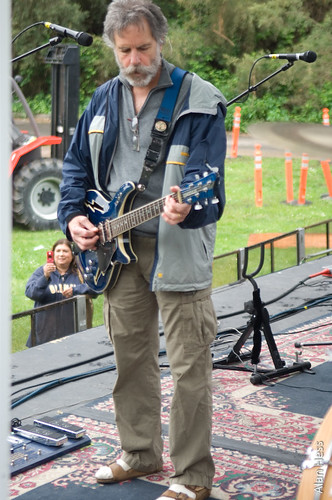
Monday, March 27, 2006
Weir and RatDog keep on playin'
Band to perform at civic center
By John W. Barry
Poughkeepsie Journal
Showering throngs in ecstasy, confusing many more and leaving others simply irritated, the Grateful Dead and its offshoot side projects for more than four decades have been touring the country, returning to cities each year like one of the four seasons while pushing a musical, cultural, societal and tribal envelope.
The Grateful Dead have been labeled counterculture icons, psychedelic gurus and beacons for hippies who don't always obey the law or tread lightly while on tour with the band. But anyone who enjoys the music of this San Francisco-based ensemble will likely tell you that 11 years after the death of lead guitarist Jerry Garcia preceded the breakup of the band, the Grateful Dead and its legacy continue to defy description.
Thousands cut from this cloth — those who have spent thousands of dollars over decades on tickets to see the Dead and traveled hundreds of miles for one night of music — are set to assemble once again Tuesday when former Dead guitarist Bob Weir brings his band RatDog to the Mid-Hudson Civic Center in Poughkeepsie.
"It's the greatest ritual I've ever participated in in my life," Christopher Pritchard of Poughkeepsie, who saw the first of his 148 Grateful Dead concerts in 1980 at Radio City Music Hall, said of attending a Dead-related concert. "Spending time with Bob Weir and listening to him play music — I couldn't think of anything I like to do more than that."
Karen Michel, a visiting professor of media arts at Marist College in Poughkeepsie, lived in San Francisco's Haight-Ashbury during the 1960s, when Janis Joplin and the Dead were local bands. She has seen the Dead perform many times, in tiny clubs and football stadiums.
'Place of allowing'
"In the increasingly repressive society in which we live," Michel said, a Grateful Dead event "was a place of allowing you to be. ... I think there is a real nostalgia among people, who could be my kids, for a time that they think was and doesn't appear to be coming up ... the Dead, it was a place of allowing and we don't have much of that anymore."
After more than 650 shows with RatDog and thousands of concerts with the Grateful Dead, Weir seems to maintain a crisp curiosity and eager enthusiasm for working his craft, night after night, city after city.
"I love to play, come on," he said during a recent interview with the Journal.
He added, "There are parts of it that are like work." But that is far outweighed by what he called "the payoff."
"Tickling the muse," he said, when asked to describe the payoff. "Coaxing out the joy."
RatDog, a sextet featuring a horn player, draws heavily from the Grateful Dead song repertoire. But Weir offers different takes on standards performed by his old band and indulges his longtime love of the cowboy songs he heard on the radio as a child and played often with his former band — "Big River" by Johnny Cash and "El Paso" by Marty Robbins among them.
Coating much of the RatDog set list is a sheen of jazz, but a take on this genre fueled by the front man who is a member of the Rock and Roll Hall of Fame and helped shape the evolution of rock 'n' roll.
"I would call it halfway between rock 'n' roll and jazz," Weir said, when asked to describe RatDog. "I'm reluctant to use the word fusion. That comes with baggage. It might not be fusion. I haven't examined it closely. Fusion to me, at least, conveys a harmonic sensibility that was endemic to the era that fusion jazz was popular, an aesthetic that was divine. We don't go there."
Many know Weir for his on-stage persona, pulling pranks on his fellow band members in front of thousands of fans, embracing a song beyond its vocals and guitar parts, gesturing as though in a Shakespeare play and revealing a propensity for lyrics infused with biblical themes. But when interacting away from the spotlights with his two daughters, ages 4 and 8, Weir seems just as satisfied.
On learning from them, Weir said, "it comes thick and fast" and "several times a day."
Learned from his kids
"I learn about myself. There are major insights and minor ones," he said. "I can't bring any to mind right now. But a large percentage of what I go through with my kids teaches me a bit about myself. Just seeing the similarities in their approaches and in some cases, seeing them break that mold."
When Weir was a kid, he took piano lessons, but his parents had the instrument carted away after he learned a left-hand boogie-woogie riff and played it incessantly. He moved on to the trumpet and was banished by mom and dad to playing outside, but following the complaints of neighbors, Weir said, "that disappeared."
"That's right about when the guitar started looking good," he said. "It was portable and it didn't make a racket that people objected to."
Wherever Weir plays, whether performing with modern music's mega-stars, like the Dave Matthews Band, or cranking out hits he's played hundreds of times, to fans who have heard these songs a hundred times, he looks for new twists and turns each time he returns to familiar territory.
"That's our job," Weir said. "If we're not doing that, we're not doing our job."
John W. Barry can be reached at jobarry@poughkeepsiejournal.com






